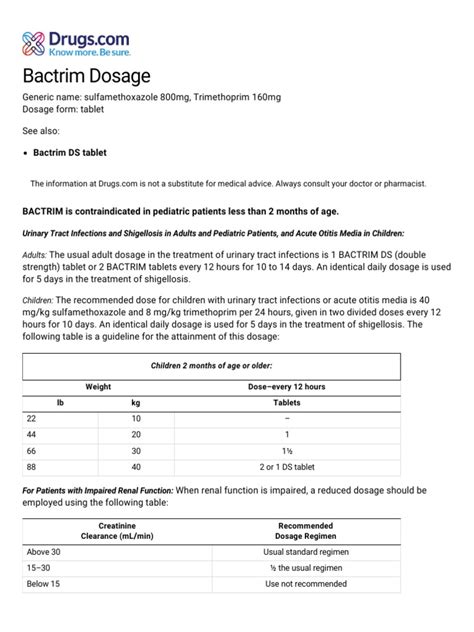Intro
Discover the uses, side effects, and precautions of Bactrim, a popular antibiotic medication. Learn how it treats bacterial infections, its common side effects, and necessary precautions to ensure safe use. Get informed about Bactrims benefits and risks, including allergic reactions, interactions, and contraindications.
Bactrim, also known by its generic name sulfamethoxazole and trimethoprim, is a widely prescribed antibiotic medication used to treat various bacterial infections. It is a combination of two antibiotics, sulfamethoxazole and trimethoprim, which work together to effectively combat bacterial infections.

Bactrim is commonly used to treat urinary tract infections, ear infections, and respiratory infections such as bronchitis and pneumonia. It is also used to treat other bacterial infections, including skin infections and infections of the digestive tract.
How Does Bactrim Work?
Bactrim works by inhibiting the growth of bacteria, allowing the body's immune system to fight off the infection. The medication targets the bacterial cells, preventing them from producing essential proteins and DNA. This ultimately leads to the death of the bacterial cells, effectively treating the infection.

Bactrim Uses and Indications
Bactrim is used to treat a wide range of bacterial infections, including:
- Urinary tract infections (UTIs)
- Ear infections
- Respiratory infections such as bronchitis and pneumonia
- Skin infections
- Infections of the digestive tract
- Other bacterial infections
It is essential to note that Bactrim is only effective against bacterial infections and will not treat viral infections such as the common cold or flu.
Off-Label Uses of Bactrim
Bactrim is sometimes used off-label to treat other conditions, including:
- Prophylaxis for Pneumocystis jiroveci pneumonia (PCP) in HIV-infected patients
- Prophylaxis for Toxoplasmosis in HIV-infected patients
- Treatment of certain types of malaria
However, these uses are not FDA-approved, and the medication should only be used for these purposes under the guidance of a healthcare professional.
Bactrim Side Effects
Like all medications, Bactrim can cause side effects, some of which can be serious. Common side effects of Bactrim include:
- Nausea and vomiting
- Diarrhea
- Stomach pain
- Headache
- Fatigue
Serious side effects of Bactrim include:
- Allergic reactions, including anaphylaxis
- Stevens-Johnson syndrome
- Toxic epidermal necrolysis
- Blood disorders, including agranulocytosis and aplastic anemia
- Liver damage

Bactrim Precautions and Contraindications
Bactrim should be used with caution in certain individuals, including:
- Patients with a history of allergy to sulfonamides or trimethoprim
- Patients with a history of kidney or liver disease
- Patients with a history of blood disorders
- Pregnant or breastfeeding women
- Children under the age of 2 months
Bactrim is contraindicated in patients with:
- A known allergy to sulfonamides or trimethoprim
- Severe kidney or liver disease
- Certain blood disorders, including aplastic anemia
- Pregnancy or breastfeeding, unless the benefits outweigh the risks
Interactions with Other Medications
Bactrim can interact with other medications, including:
- Warfarin
- Phenytoin
- Cyclosporine
- Methotrexate
- Other antibiotics
It is essential to inform your healthcare provider of all medications you are taking before starting Bactrim.
Dosage and Administration
The dosage and administration of Bactrim vary depending on the condition being treated and the patient's age and weight. The medication is typically taken orally, either with or without food.

Conclusion
Bactrim is a commonly prescribed antibiotic medication used to treat various bacterial infections. While it can be effective, it is essential to use the medication with caution and follow the guidance of a healthcare professional. By understanding the uses, side effects, and precautions of Bactrim, patients can ensure safe and effective treatment.
We encourage you to share your thoughts and experiences with Bactrim in the comments below. Have you or a loved one used Bactrim to treat a bacterial infection? What were your experiences with the medication?
What is Bactrim used to treat?
+Bactrim is used to treat various bacterial infections, including urinary tract infections, ear infections, and respiratory infections such as bronchitis and pneumonia.
What are the common side effects of Bactrim?
+Common side effects of Bactrim include nausea and vomiting, diarrhea, stomach pain, headache, and fatigue.
Can Bactrim be used to treat viral infections?
+No, Bactrim is only effective against bacterial infections and will not treat viral infections such as the common cold or flu.
